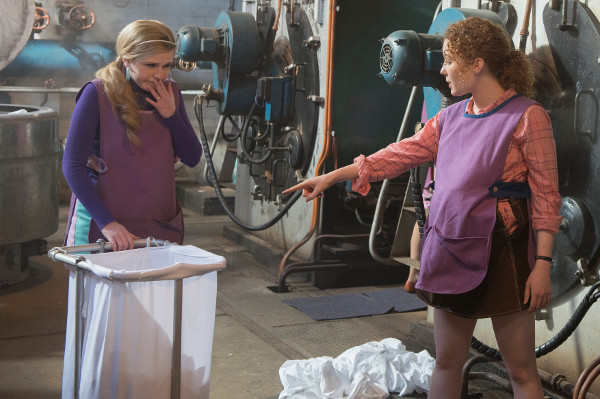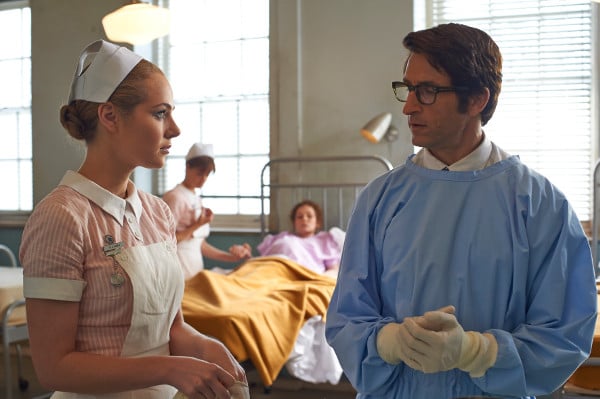Protests In Pastels: ‘Love Child’ Shines A Light On A Troubling Period In Australian History
Despite its soapy leanings, Nine's new '60s-set series is more than just an excuse to crack out the mod outfits.

It’s 1969 and Vivian Maguire is underage, unmarried, and pregnant. Society is not willing to accept a single mother, and neither are her parents. As a result, Viv finds herself drugged and abandoned at Stanton House in Sydney’s Kings Cross, a hospital-run facility for unwed mothers.
So began Love Child, Nine’s new eight-part series, which shines a light on a period of time in Australian history when having a child outside of marriage was so shameful that adoption was expected and sometimes forced. There are no exact figures for how many children were given up in this way between 1950 and 1980, but estimates are in the hundreds of thousands. The magnitude and impact was large enough that on March 21 last year, Julia Gillard issued an official apology on behalf of the Australian Government.
Does the topic sound familiar? If you’ve seen Oscar ‘Best Picture’ contender Philomena, then it damn well should. Just swap out the evil nuns for a dour matron and some dubious doctors, and you’ve got yourself some serious parallels. However, despite the subject matter and bubblegum-coloured costumes, the series isn’t simply Judi Dench parachuted into an episode of Mad Men.
It seems fitting to have a ‘period’ drama about unwanted pregnancy (heh), and Love Child is a taster plate of all the issues we’re supposed to associate with the late ’60s. There’s a war on and protests are dividing society and families, being a female automatically means that your opinion counts for less, and racism is just a normal part of day-to-day life. The show skirts the line between drama and soap opera, but the era it acknowledges seems authentic (or at least looks like what film and television has told us all the ’60s looked like).
My main criticism at this point (I’ve flicked ahead four episodes) is the show’s tendency to introduce topics superficially, but never delve into them in any detail. The depiction of the Vietnam War sits in this awkward middle ground: it’s too well-realised to be simply background, but not explored to a sufficient degree to become a major theme of the show. Also, for some reason, all the male characters (with only one exception) are jerks. Sometimes they do nice things, but at the base of it all, they’re still jerks. Vivian’s loving father? He drugged and abandoned her. The love interest doctor? He’s married and a baby thief. The fathers of all these babies? Absent, and dating again. In last night’s episode alone, we already experienced more emotions than a mood ring in a microwave. There’s lust, joy, betrayal, and hate. Then we move to the second scene, and do it all again.
Love Child is filled with a host of well-realised characters, but unfortunately it struggles to settle on one protagonist, which creates a grounding issue. While this mantle is initially taken up by the pregnant Viv (Sophie Hansser), a rebel who rallies the other unwed mothers into comic relief activities like sneaking out of the facility or stealing a TV to watch the Apollo mission take off, the series for the most part centres around the experiences of Joan Millar (Jessica Marais), a fiercely independent mid-wife and a staunch advocate of the rights of the Stanton Girls. That the majority of the plot takes place in an institution is no excuse for the confusion: Orange Is The New Black manages to have an ensemble cast without a Thunderdome-esque battle for the role of main protagonist.
The way in which Love Child jumps between light and dark can also be jarring, but it’s a necessary addition to help stop the show from turning into a bleak downwards spiral of despair and depression. In pure fiction, it’s easy to brush off the bad things that happen to characters; Love Child does not offer this luxury. When you see a woman having her breasts bound with tight bandages to stop the flow of milk being produced for a child she was never allowed to hold, this didn’t come out of the mind of a writer — it came from an anecdote.
Despite positive numbers following last night’s premiere, Love Child isn’t likely to be a runaway success. No one is going to go out and buy the DVD, except for that one person who is already hitting up the sewing blogs because she loves the costumes. It would be easy to write off the show as an excuse to crack out the pastel makeup, or as a vehicle to present an issue for us all to “tsk-tsk” at and think “That would never happen now…”. However, at the centre of the show is the idea that one group can marginalise another while everyone else simply turns a blind eye, and it remains a story worth telling.
–
Love Child airs on Nine on Mondays at 8:40pm. Catch up on last night’s episode at Jump-In.
–
Elizabeth is a freelance writer with a focus on film, television and pop culture. She edits Subterranean Death Cult, has been published in Film Ink, Metro, The Punch, and Lip Magazine, and tweets terrible puns @ElizabethFlux

